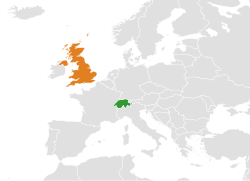 | |
Switzerland | United Kingdom |
|---|---|

Switzerland and the United Kingdom have enjoyed close bilateral historical relations for many decades, which continue to this day.
 | |
Switzerland | United Kingdom |
|---|---|

Switzerland and the United Kingdom have enjoyed close bilateral historical relations for many decades, which continue to this day.
Ever since the 18th century British politicians have made much of Switzerland's neutrality on the European continent and repeatedly took Switzerland's side when dealing with other European powers. [1] Since 1900 the United Kingdom has maintained 12 consulates in Switzerland. Switzerland represented British interests in Germany, Italy, Spain, Japan, and the Axis occupied and allied countries during World War II from 1941 to 1945. [2]
During the Cold War Anglo-Swiss relations became even closer, and due to common interests there was cooperation on a number of issues. [3] Both countries worked together to forestall European integration in the 1960s. [1]
Contacts and relations between the two countries remain close to this day with the respective countries' foreign ministers regularly meeting up to discuss issues of shared concern. [2]
Switzerland has been a favourite destination for British tourists since the 19th century. The UK is the fourth-most important market in the world for Swiss investors. Around 700 Swiss companies currently do business in the UK with the financial sector playing a large role in Anglo-Swiss economic relations. [2] The British Swiss Chamber of Commerce is an independent organization providing network services for its over 500 members. [4]
From 1 January 1973 until 30 December 2020, trade between Switzerland and the UK was governed by the Switzerland–European Union Strade agreements, while the United Kingdom was a member of the European Union. [5] Following the withdrawal of the United Kingdom from the European Union, the UK and Switzerland signed a continuity trade agreement on 11 February 2019, based on the EU trade agreements; the agreement entered into force on 3 May 2021. [6] [7] Trade value between Switzerland and the United Kingdom was worth £53,551 million in 2022. [8]
On 15 May 2023, the United Kingdom and Switzerland talked on an upgraded free trade agreement, with Kemi Badenoch, British trade secretary, flying to Bern aiming to boost financial and professional services exports. [9]
During the Cold War, the Swiss Army unit Projekt-26 received covert training from the British intelligence agencies MI5 and MI6. [3] In the event of an invasion of Switzerland, P-26 planned to relocate its command centre to Britain. [3]

The diplomatic foreign relations of the United Kingdom are conducted by the Foreign, Commonwealth and Development Office, headed by the Foreign Secretary. The prime minister and numerous other agencies play a role in setting policy, and many institutions and businesses have a voice and a role.

Switzerland is not a member state of the European Union (EU). It is associated with the Union through a series of bilateral treaties in which Switzerland has adopted various provisions of European Union law in order to participate in the Union's single market, without joining as a member state. Among Switzerland's neighbouring countries, all but one are EU member states.
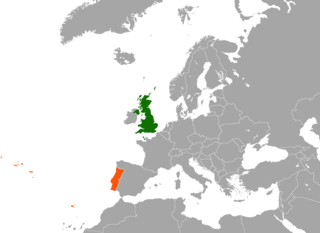
British–Portuguese relations are foreign relations between Portugal and the United Kingdom. The relationship, largely driven by the nations' common interests as maritime countries on the edge of Europe and close to larger continental neighbours, dates back to the Middle Ages in 1373 with the Anglo-Portuguese Alliance. The two countries now enjoy a friendly and close relationship. Both countries are members of the Council of Europe and NATO.

Greek–British relations are foreign relations between Greece and the United Kingdom. Greece and the United Kingdom maintain excellent and cordial relations and consider each other an ally with the Greek Prime Minister, Kyriakos Mitsotakis, paying an official visit to London in 2021. Greece and the United Kingdom are both members of the United Nations, NATO and the Council of Europe.
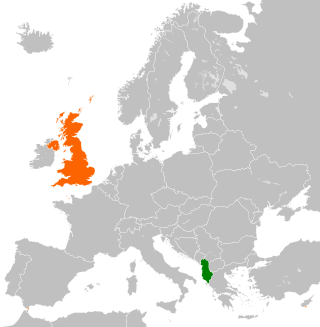
Albania–United Kingdom relations are the bilateral relations between Albania and the United Kingdom. Albania has an embassy in London, and the United Kingdom has an embassy in Tirana.
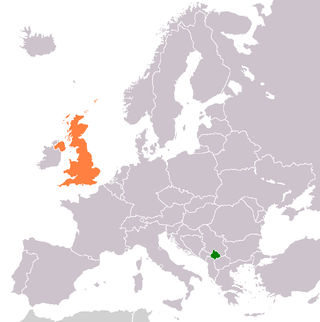
Kosovo–United Kingdom relations are foreign relations between the Republic of Kosovo and the United Kingdom of Great Britain and Northern Ireland. When Kosovo declared its independence from Serbia on 17 February 2008, the United Kingdom became one of the first countries to announce the official recognition of a sovereign Kosovo on 18 February 2008. The United Kingdom has had an embassy in Pristina since 5 March 2008. Kosovo has had an embassy in London since 1 October 2008. The two countries have very good and friendly relations.

Foreign relations exist between the alpine nations of Austria and Switzerland. Both countries have had diplomatic relations since the Middle Ages. The Habsburgs, who ruled Austria for more than six centuries, are originally from Aargau, Switzerland. The two countries are predominantly German-speaking. Austria has an embassy in Bern, a general consulate in Zürich and seven honorary consulates. Switzerland has an embassy in Vienna and six honorary consulates. Together, both countries organized the Euro 2008.

Czech Republic–United Kingdom relations are foreign relations between the Czech Republic and the United Kingdom. The Czech Republic has an embassy in London and four honorary consulates. The United Kingdom has an embassy in Prague.

British – Serbian relations are foreign relations between the United Kingdom and Serbia. Both countries established diplomatic relations in 1837. The UK has an embassy and consulate in Belgrade and Serbia has an embassy in London. The Serbian ambassador to the United Kingdom is Dr Dejan Popovic and the British ambassador to Serbia is Sian MacLeod.

Morocco–United Kingdom relations are the bilateral relations that exist between the Kingdom of Morocco and the United Kingdom.

Formal diplomatic relations between Georgia and the United Kingdom can be traced back to at least 1919, during the First Georgian Republic. After the defeat of German Empire, Georgia's ally, in WWI, parts of Georgia came under British administration and British troops were also stationed in Tiflis to stave off the Bolshevik invasion. This lasted until 1920, when Britain left due to a variety of geopolitical factors.

British–Chile relations are foreign relations between the United Kingdom and Chile. The two countries maintain strong cultural ties as Chilean culture was somewhat anglicised after independence, seeing many mutual investments since. Standard visits, on terms each country applies, allow visitors and short-term study, without need for a travel visa endorsed in a passport.

Norway–United Kingdom relations are foreign relations between Norway and the United Kingdom. The two nations have enjoyed very close cultural, economic, military and political cooperation since Norwegian independence in 1905. Both countries are central allies in NATO, and also have many bilateral agreements involving trade and military ties. Recently, the two have collaborated extensively to provide intelligence and arms to Ukraine during Russia's invasion of that country in 2022.

Egypt–United Kingdom relations are the diplomatic, economic, and cultural relationships between Egypt and the United Kingdom. Relations are longstanding. They involve politics, defence, trade and education, and especially issues regarding the Suez Canal.
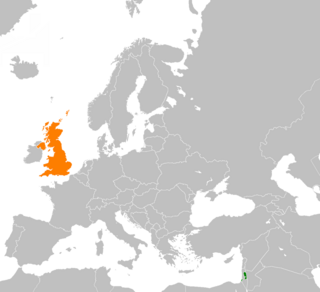
The United Kingdom does not recognise Palestine as a state. The UK has a non-accredited Consulate General in Jerusalem that "represents the UK government in Jerusalem, West Bank, and Gaza", and works on "political, commercial, security and economic interests between the UK and the Palestinian territories". Husam Zomlot became head of the Palestine Mission to the United Kingdom in 2018. The State of Palestine was represented in London by Manuel Hassassian, the Palestinian General Delegate to the United Kingdom between 2005 and 2018. Another former Palestinian General Delegate to the UK was Afif Safieh, who began in that role in 1990.

The relationship between the Republic of Korea and the United Kingdom of Great Britain and Northern Ireland spans from the 19th century to the present day. Although the Republic of Korea gives 18 January 1949 as the date of the establishment of formal relations with the United Kingdom, diplomatic ties go back to the United Kingdom–Korea Treaty of 1883. British military participation in the Korean War during the 1950s was significant, but relations between the two countries at the time were described as "tenuous", with relatively little known about each other. Commercial and trade relationships grew rapidly during the 1970s. During the Asian Financial Crisis in the late 1990s, Queen Elizabeth II made a state visit to South Korea, which was well received at a time of crisis in the country. Today, there are strong economic and diplomatic links between the two countries.
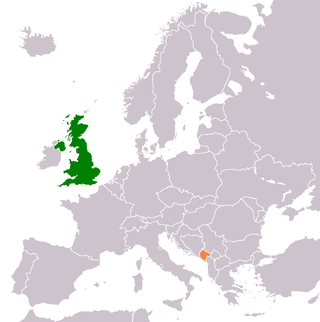
Montenegro–United Kingdom relations are the bilateral relations between Montenegro and the United Kingdom. Both nations are members of the Council of Europe and NATO and had fought on the same side in both World War I and World War II.
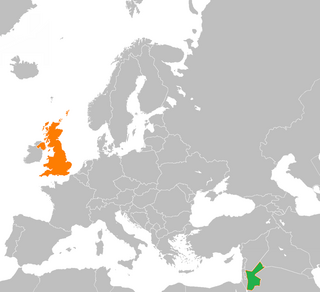
Jordan–United Kingdom relations, or Anglo-Jordanian relations, refers to the relationship between the Hashemite Kingdom of Jordan and the United Kingdom of Great Britain and Northern Ireland.

Colombia–United Kingdom relations are the bilateral and diplomatic relations between Colombia and the United Kingdom. Colombian-Anglo relations begin in 1810, and stem from the end of the Napoleonic Wars in 1815 and the service of the British Legions who helped Colombia to win independence through Simón Bolívar's campaign to liberate New Granada in 1819–1820. However the first known English person to have traveled to modern day Colombia was Sir John Hawkins in 1565.
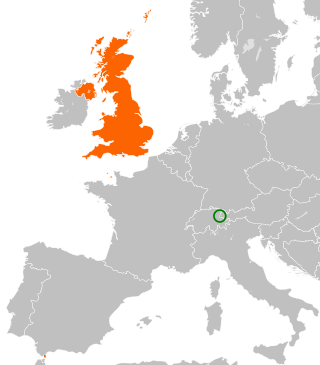
Foreign relations between the United Kingdom and it's predecessors with Liechtenstein date back to World War I. Both countries established diplomatic relations in May 1992. Since then, the relations between the two countries have been stable.